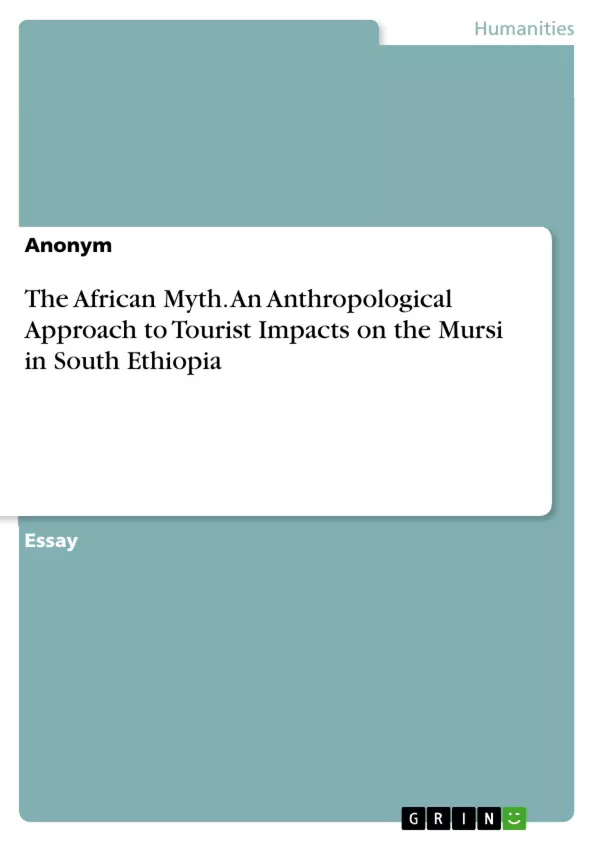This work will focus on the Host-Guest Relation of this complex situation, symbolically for our society, and it’s possible impacts. This will be answered on the example of the ethnic group of the Mursi living in Ethiopia.
Twenty years ago, the ethnically heterogeneous area was still relatively unknown. Now Ethno-Tourism plays a central role in the lives of these groups. While the tourists' increasing interest in the local culture of the ethnic groups contrasts with their devaluation by the state.
I will collect voices of scholars who have devoted themselves to the Anthropology of Tourism debate and the study of specifically Ethiopian occurrences. Due to my self-location in the western context, this will be an approach to the subject area.
Some central questions of this paper will be: What moves the foreigner to travel these long distances and how does the way of confrontation with the culturally foreign affect the Mursi people? Are existential foundations of one's own identity touched and how does this manifest itself? What role does the state play in preserving cultures or promoting tourism?
First I’m gonna introduce the two main groups of this discourse, the Tourists and the Mursi, followed by an analysis of their encounter. Based on this, the change of the receiving culture will be discussed. Then I'm gonna focus on the political situation, as this may shed light on the mentioned phenomenons.
Inhaltsverzeichnis (Table of Contents)
- Introduction
- The Mursi
- The Tourists
- The Encounters
- Change
- Masquerades and Body Paintings
- Hierarchy
- Movement
- Economy
- Political Frame
Zielsetzung und Themenschwerpunkte (Objectives and Key Themes)
This essay examines the impacts of tourism on the Mursi people in South Ethiopia. It uses the concept of the "tourist gaze" to analyze how tourists' expectations influence the Mursi identity. The work aims to explore the complex host-guest relationship and its implications for the Mursi community.
- The impact of tourism on indigenous cultures
- The role of the "tourist gaze" in shaping local identities
- The interplay between tourism and the political situation in the region
- The authenticity of cultural experiences in tourism
- The power dynamics between tourists and local communities
Zusammenfassung der Kapitel (Chapter Summaries)
- Introduction: This chapter sets the stage by introducing the concept of the tourist gaze and its implications for cultural encounters. It explores the expectations tourists bring to Africa and their impact on local communities. The chapter also introduces the Mursi people and the context of tourism in their region.
- The Mursi: This chapter provides an overview of the Mursi people, their culture, and their traditional way of life. It highlights key aspects of their social organization, economy, and cultural practices, including the significance of the lip plate.
- The Tourists: This chapter explores the motivations and expectations of tourists visiting the Omo Valley. It examines the role of ethno-tourism, the marketing of the region, and the impact of stereotypes on tourist perceptions.
- The Encounters: This chapter analyzes the interactions between tourists and the Mursi people. It explores the complexities of cultural exchange, the impact of staged encounters, and the challenges of understanding cultural differences.
- Change: This chapter discusses the impact of tourism on various aspects of Mursi life, including their cultural practices, social structures, and economy. It explores the ways in which tourism has influenced aspects like masquerades, hierarchy, movement, and economic activities.
Schlüsselwörter (Keywords)
The main keywords and focus topics of this work are: tourism, anthropology, cultural impact, indigenous cultures, Mursi, Ethiopia, Omo Valley, ethno-tourism, tourist gaze, authenticity, power dynamics, host-guest relationships, identity, change.
- Quote paper
- Anonym (Author), 2021, The African Myth. An Anthropological Approach to Tourist Impacts on the Mursi in South Ethiopia, Munich, GRIN Verlag, https://www.hausarbeiten.de/document/1292126


